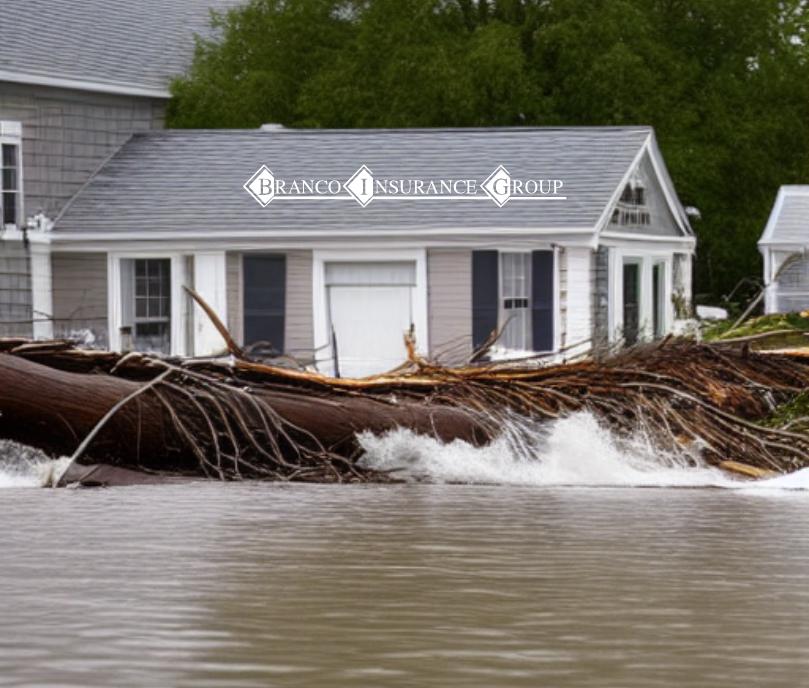
Mental Health Awareness Month: Prioritize the Mind, Support the Heart
May is Mental Health Awareness Month, a time to reflect on the importance of emotional well-being and the invisible battles many face daily. At Branco

When it comes to hurricane insurance, there is no one-size-fits-all solution. The amount of coverage you need depends on various factors, including the value of your home, the type of home you have, and your location. This blog post will walk you through choosing the right hurricane insurance coverage for your needs.
The first step in choosing the right hurricane insurance coverage is to determine the value of your home. To do this, you’ll need to obtain a recent appraisal or have your home assessed by a professional. Once you have the value of your home, you can begin to shop around for hurricane insurance policies that will cover the full value of your property.
Two types of homeowner’s insurance policies will cover damage caused by hurricanes: all-risk and named-peril policies. All-risk policies cover any type of damage that is not explicitly excluded in the policy. In contrast, named-peril policies only cover damage from causes that are specifically named in the policy. Named-peril policies are typically cheaper than all-risk policies, but they may not provide as much coverage.
Another factor to consider when choosing hurricane insurance is your location. If you live in an area prone to hurricanes, you’ll need to purchase a policy with higher coverage limits than if you live in an area that is not prone to hurricanes. Additionally, you’ll need to purchase a policy covering flooding and wind damage if you live in a coastal area. Most standard homeowner’s insurance policies do not cover flooding.
No two homeowners are exactly alike, which means that there is no one-size-fits-all solution when it comes to hurricane insurance. Your coverage depends on factors like your home’s value and location. By following the tips outlined in this blog post, you can be sure that you’re choosing the right hurricane insurance coverage for your needs.

If you live in a hurricane-prone area, you know how important it is to have hurricane insurance. But what exactly is hurricane insurance? And what does it cover? In this blog post, we’ll answer those questions and more so that you can be sure you’re fully protected against the next big storm.
Hurricane insurance is a type of property insurance that covers damage caused by hurricanes. Hurricane insurance policies typically cover wind damage, flooding, and other damage caused by storms, such as fallen trees. Many homeowners’ insurance policies do not cover hurricane damage, so it’s crucial to have a separate policy if you live in an area susceptible to these types of storms.
Hurricane insurance policies typically cover repairs to your home or other structures on your property, such as detached garages or sheds. The policy will also pay for the replacement of any belongings that are damaged or destroyed in the storm. Most policies limit the amount they will pay out for specific items, such as jewelry, so it’s essential to check your policy limits before a storm hits.
Be sure to review your policy limits before the next big storm hits so that you can be sure you’re fully protected.
If you live in a hurricane-prone area, hurricane insurance is a must. But with so many options available, how do you choose the right policy for your needs? Keep reading to find out.
Before we dive into choosing the right hurricane insurance policy, it’s important to understand the difference between homeowners insurance and hurricane insurance. Homeowners insurance provides coverage for damages caused by fire, theft, vandalism, and some natural disasters. On the other hand, Hurricane insurance provides coverage specifically for damage caused by hurricanes. Standard homeowner’s insurance may not cover all hurricane-related damages, but hurricane insurance does provide this protection and frequently matches the coverage of a homeowner’s policy.
Hurricane insurance policies typically cover damage to your home and property caused by high winds, flooding, and flying debris. Some policies also provide coverage for temporary living expenses if your home is uninhabitable due to hurricane damage.
The cost of hurricane insurance varies depending on several factors, including the value of your home, the amount of coverage you need, and the deductible you’re comfortable with. In general, you can expect to pay anywhere from a few hundred dollars to several thousand dollars per year for a good hurricane insurance policy.
Now that you know a little bit more about hurricane insurance, let’s look at three tips to help you choose the best policy for your needs.
The first step in choosing the right policy is knowing what needs to be insured. For example, if you have a mortgage on your home, your lender will require you to have enough insurance to cover the outstanding balance on your loan. Likewise, if you have valuable possessions inside your home (like jewelry or art), you’ll want to ensure those are properly insured. Once you know what needs to be covered, you can start shopping around for quotes.
It’s important to compare quotes from different insurers carefully before deciding. Make sure you’re comparing similar coverage levels so you can accurately compare prices. Also, beware of insurers that seem too good to be true—in many cases, they are! If an insurer seems to be offering significantly lower rates than their competitors, there’s a good chance they’re cutting corners elsewhere (like customer service or claims processing).
In addition to hurricane insurance, you may also want to consider buying flood insurance separately. Homeowner’s or hurricane insurance policies do not typically cover flooding—you’ll need a separate policy. Fortunately, flood insurance is relatively affordable (especially when compared to rebuilding your home from scratch!). Remember that there’s usually a 30-day waiting period before flood insurance goes into effect, so don’t wait until a storm brewing to buy coverage!
Choosing the right hurricane insurance doesn’t have to be daunting—just follow these three simple tips, and you’ll be well on your way. Remember: knowing what you need to insure, comparing apples to apples, and considering buying flood insurance separately are key when choosing a policy.
As a homeowner, it’s important to ensure that you have the right kind of insurance to protect your home in the event of a natural disaster. While most standard homeowners insurance policies will cover damage from severe weather events like thunderstorms and tornadoes, they typically don’t cover damage from hurricanes.
If you live in an area prone to hurricanes, it’s important to ensure that you have hurricane coverage as part of your homeowner’s insurance policy. Hurricane coverage can help to protect your home from wind damage, flooding, and other types of damage that a hurricane can cause.
There are a few different types of hurricane coverage that you can choose to add to your homeowner’s insurance policy. Some of the most common types of hurricane coverage include:
When adding hurricane coverage to your homeowner’s insurance policy, it’s important to ensure that you have enough coverage to protect your home in the event of severe damage. The amount of coverage you’ll need will depend on factors like the value of your home and the number of personal belongings you have.
It would help if you worked with your insurance agent to determine the right amount of coverage for your needs. In some cases, purchasing additional insurance through a separate policy or a rider on your existing policy may be a good idea.
Hurricane season is just around the corner, so now is the time to review your homeowner’s insurance policy and ensure that you have adequate protection against hurricanes and other severe weather events. Adding hurricane coverage to your policy can help safeguard your home and belongings in the event of serious damage. Work with your insurance agent to determine how much coverage is right for you so that you can be prepared for anything this hurricane season throws your way.
No one ever wants to deal with the aftermath of a hurricane, but unfortunately, it’s something that many of us have to face every year. If a hurricane has damaged your home and you don’t have hurricane insurance, you may be wondering what to do. Here are five steps to filing a hurricane insurance claim:
1. The first thing you should do is contact your insurance agent or company as soon as possible. They will need to know the details of the damage and will be able to help you start the claims process.
2. Make sure you have a list of all the damage done to your property, both inside and outside. This list should include everything from broken windows to fallen trees. Be as specific as possible when creating this list.
3. Take plenty of pictures or videos of the damage. This will help support your claim and make it easier for your adjuster to see the extent of the damage.
4. Most insurance companies will require you to get at least three estimates for repairs. Be sure to get these from reputable contractors in your area.
5. Once you have all the required information, your insurance company will send an adjuster to assess the damage and give you a settlement offer. If you’re unhappy with this offer, you can negotiate with your adjuster or hire a public adjuster to help you get a fair settlement.
Filing a hurricane insurance claim can be a daunting task, but it’s important to remember that you’re not alone. Your insurance company will be there to help you through every step of the process. Just ensure you’re prepared with all the necessary information before you start so things go as smoothly as possible.

Homeowners insurance covers a lot, but hurricanes are one of the few things that most policies don’t automatically cover. So, if you live in an area that’s prone to hurricanes, you may be thinking about purchasing hurricane insurance. But what factors should you consider when choosing a policy?
One of the first things you’ll need to decide when choosing a hurricane insurance policy is how much you’re willing to pay out of pocket if a hurricane damages your home. Most policies have a deductible, which is the amount of money you’ll have to pay before your insurance coverage kicks in. For example, let’s say your deductible is $5,000, and your home sustains $50,000 in damage from a hurricane. In this case, your insurance company will reimburse you for $45,000 of the damage (minus any other fees or charges associated with your policy).
It’s important to choose a deductible that you’re comfortable with. If you choose a deductible that’s too low, your premiums will be higher. On the other hand, if you choose a deductible that’s too high, you could find yourself having to pay for more repairs than you can afford if a hurricane damages your home.
Another important factor to consider when choosing hurricane insurance is coverage limits. Most policies come with limits on how much they’ll pay out for certain types of damage. For example, some policies may only cover up to $10,000 for roof damage. That means if the hurricane damage to your roof exceeds $10,000, you’ll have to pay for the repairs yourself.
Not all hurricane insurance policies are created equal. Some policies will only cover damage caused by wind, while others may also cover flooding or other types of storm damage. It’s important to read the fine print of any policy you’re considering so that you know what kinds of damage it covers—and doesn’t cover. For example, let’s say your home sustains both wind and flood damage during a hurricane. If your policy only covers wind damage, then you’ll have to pay for the flood damage out of pocket (unless you have separate flood insurance). On the other hand, if your policy covers both wind and flood damage, then your insurer will reimburse you for both types of damages (up to your policy limit, of course).
These are just a few of the factors you should consider when choosing hurricane insurance for your home. Be sure to compare several different policies before deciding to find one that perfectly meets all of your needs and budget.

If your home was damaged or destroyed by a hurricane, you might be wondering how to file an insurance claim. Filing an insurance claim can be a daunting task, but we’re here to help. Here are step-by-step instructions on the process of filing a hurricane insurance claim.
Step 1: Call your insurance agent or company as soon as possible. Your agent or company will need to know the details of the damage and will start the claims process.
Step 2: Gather all of the necessary documentation. This includes things like receipts, photos, and estimates for repairs. You will also need to provide proof of ownership for your home and any personal belongings that were damaged or destroyed.
Step 3: Submit your documentation to your insurance company. Your insurance company will use this information to process your claim and determine the amount of money you are eligible to receive.
Step 4: Keep track of all of your expenses related to the damage. This includes things like hotel stays, meals, and repairs. You will need to submit these expenses to your insurance company in order to be reimbursed.
Filing a hurricane insurance claim can be a daunting task, but we’re here to help. By following these simple steps, you can ensure that your claim is processed quickly and smoothly. If you have any questions about the claims process, don’t hesitate to contact your insurance agent or company for assistance.
As we enter hurricane season, it’s important to be prepared. Hurricane preparation goes beyond having enough batteries and non-perishable food; if you live in an area that’s prone to hurricanes, you need to make sure you have the proper insurance coverage. Homeowner’s insurance will cover some damages caused by a hurricane, but typically only wind damage—not flooding. And while your home may be covered, your belongings probably are not. That’s why it’s important to have hurricane insurance.
If you don’t have hurricane insurance, you can still do some things to prepare for a storm. Here are a few tips:
1. Create an emergency kit. This should include items like non-perishable food, water, a first-aid kit, medications, a flashlight, and extra batteries.
2. Make sure you have cash on hand. ATMs will be out of service after a hurricane, so it’s important to have cash on hand in case you need to make purchases.
3. Know your evacuation route. If you’re told to evacuate, know where you’re going ahead of time and have a plan for getting there.
4. Bring in any loose objects from outside. This includes things like potted plants, lawn furniture, and garbage cans. Not only will this help protect your belongings from damage, but it will also help prevent them from becoming projectiles during high winds.
5. Board up your windows with plywood or storm shutters. This will help protect your windows from breaking and causing damage to your home.
6. Keep your car fueled up. In the event of an evacuation, you’ll want to make sure your car has enough gas to get you where you need to go.
7. Turn off utilities at the main power switch if instructed to do so by authorities. This will help prevent further damage to your home and reduce the risk of fire or electrocution.
8. Charge all of your electronic devices. This way, you’ll have access to news and updates even if power is out for an extended period of time.
9. Stay tuned to local news stations or follow trusted sources on social media for updates on the storm. This way, you’ll know when it’s safe to return home or when conditions are getting worse.
10. Have an emergency plan for your pets. If you need to evacuate, make sure you have a place for them to stay as well; do not leave them behind.
A hurricane can be a daunting event—but with proper preparation, it doesn’t have to be disastrous. Following these simple tips can weather the storm and come out unscathed.
When a hurricane is headed your way, it’s important to have the right insurance coverage in place to protect your home and belongings. Not all homeowners policies offer hurricane insurance, so it’s important to review your policy carefully or contact your agent if you have questions about what is covered.
You may also want to consider purchasing additional wind and water damage coverage as well as flood insurance, depending on where you live and your risk for flooding.
By reviewing your options and purchasing the appropriate coverage, you can rest assured that you’re prepared for whatever Mother Nature throws your way. If you have any questions or need any guidance on selecting the right hurricane coverage for your home or business, contact our experts at Branco Insurance Group.
We look forward to helping you.

May is Mental Health Awareness Month, a time to reflect on the importance of emotional well-being and the invisible battles many face daily. At Branco

Two of Naugatuck’s long-standing insurance professionals have joined forces. Beginning on April 14th, the Healy-Lynn Insurance Agency has become a division of Branco Insurance Group.
